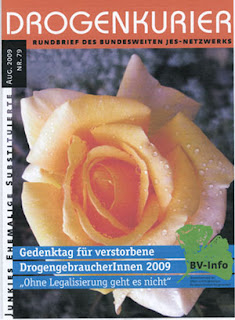TO THOSE WHO WOULD CRITICIZE SEMANTICS...

Especially in the US, advocates of methadone (and buprenorphine) maintenance treatment express outrage over the word “substitution”! It would seem more productive if they focused their attention on acts, rather than on words. Thus, one of the oldest and most effective self-help and advocacy groups in Germany calls itself (itself!) JES...“Junkies, ex-junkies, and those being substituted.” And what have they and allies accomplished? First, there are over 70,000 patients receiving “substitution” with methadone in Germany - hardly 20 years earlier there were none; no one group or individual can claim the credit, but JES has been a critical voice. Also, this year on July 21 the 11th national “memorial day in tribute to the victims of the drug war” was marked in dozens of cities, large and small, throughout the country. A journal (cover image shown here) put out jointly by JES, parents’ groups and “German-AIDS Help” gave the highlights of the day for many of these cities. A case in point: Recklinghausen – “the 60th largest city in Germany”, describes its treatment efforts as follows: SUBSTITUTE FOR DRUGS - dependent patients participate in the substitution program and thereby avoid the possibility of death.”
Critics, and especially American critics, of the label German drug users and former users adopt for themselves should reflect on the situation at home: can anyone imagine a large public demonstration in America honoring the memory of victims of the drug war? Let alone dozens of such demonstrations coordinated throughout the US? Would anyone deign to condemn a group as courageous and effective as JES because of the name it uses - proudly and unapologetically - to define itself and its members?
